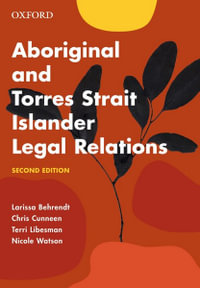
At a Glance
Hardcover
RRP $297.00
$175.25
41%OFF
Aims to ship in 5 to 10 business days
When will this arrive by?
Enter delivery postcode to estimate
Many of the suits seeking redress have been based on the landmark 1971 Supreme Court decision in Bivens v. Six Unknown Named Agents of the Federal Bureau of Narcotics. This book traces the history of common law accountability, the rise of Bivens claims, and the post-Bivens history of constitutional tort litigation. After evaluating the failure of Bivens litigation arising from the war on terror, the book considers and rejects the arguments that have been put forward to explain and justify judicial silence.
The book provides the Supreme Court with the tools needed to rethink its Bivens jurisprudence. Rather than treating the overseas national security context as disabling, modern federal courts should take a page from the nineteenth century, presume the viability of tort litigation, and proceed to the merits. Only by doing so can the federal courts ensure redress for victims and prevent future Administrations from using torture as an instrument of official policy.
Industry Reviews
ISBN: 9780190495282
ISBN-10: 0190495286
Published: 9th March 2017
Format: Hardcover
Language: English
Number of Pages: 288
Audience: Professional and Scholarly
Publisher: Oxford University Press USA
Country of Publication: GB
Dimensions (cm): 23.9 x 15.5 x 2.5
Weight (kg): 0.5
Shipping
| Standard Shipping | Express Shipping | |
|---|---|---|
| Metro postcodes: | $9.99 | $14.95 |
| Regional postcodes: | $9.99 | $14.95 |
| Rural postcodes: | $9.99 | $14.95 |
How to return your order
At Booktopia, we offer hassle-free returns in accordance with our returns policy. If you wish to return an item, please get in touch with Booktopia Customer Care.
Additional postage charges may be applicable.
Defective items
If there is a problem with any of the items received for your order then the Booktopia Customer Care team is ready to assist you.
For more info please visit our Help Centre.
You Can Find This Book In
This product is categorised by
- Non-FictionPolitics & GovernmentPolitical Control & FreedomsHuman Rights
- Non-FictionLawLaws of Specific JurisdictionsConstitutional & Administrative LawGovernment Powers
- Non-FictionLawJurisprudence & General IssuesLegal History
- Non-FictionLawInternational Law
- Non-FictionLawJurisprudence & General IssuesSystems of LawCommon Law
- Non-FictionLawJurisprudence & General IssuesJurisprudence & Philosophy of Law
- Non-FictionLawLaws of Specific JurisdictionsTorts























